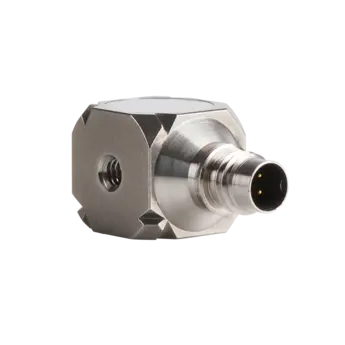Triaxial IEPE accelerometers, ceramic shear, high sensitivity, 5 … 50 g / 8788A

8788A
Main features / advantages
- Low impedance, voltage mode
- Ceramic shear sensing element
- High sensitivity; resolution less than 0.1 mg
- Measuring ranges: 5, 10, 50 g
- TEDS options available
- IP68 option with 10 bar integral cable
Type 8788A are miniature and lightweight triaxial accelerometers which reduce mass loading on thin-walled structures important to multichannel modal applications or general vibration measurements.
What is the basic difference between the high sensitivity accelerometers Type 8740A and the 8788A?
The Type 8740A is a single axis IEPE accelerometer, where the 8788A is a triaxial accelerometer.
What are the advantages of the new IEPE accelerometer Type 8788A compared to the previous version?
The IEPE accelerometer Type 8788A has a lower noise threshold, and uses a shear sensing element that makes it much more robust.
Can the high sensitivity accelerometer Type 8788A be used for underwater applications?
Yes it can, if an integral cable version (denoted with an “SP” at the end of the type number) is chosen. Each 8788A…SP accelerometer is tested for waterproofing when it is produced.
What are the benefits choosing TEDS option for the accelerometer Type 8788A?
The TEDS option for the accelerometer Type 8788A allows for the sensor to be directly connected to a DAQ, without needing to put in specification data.
What kind of applications can the accelerometer 8788A be used in?
The accelerometer 8788A can be used in a variety of applications, including modal analysis, NVH measuring and micro-g testing.
Can the accelerometer 8788A be used in space?
Yes, with it’s hermetic sealing the 8788A accelerometer is low-outgassing and can be used in a vacuum safely.
What are the benefits of mounting the Type 8788A accelerometer with a stud?
Using a stud mount with the Type 8788A accelerometer can ensure as high of a frequency response as possible.
